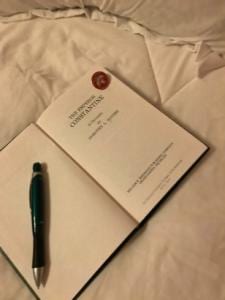Earth and water and air- but the beginning and the ending is fire; Light in the first day, fire in the last day, at the coming of the Word; and Our Lord the Spirit descending in light and in fire.
 Dorothy Sayers wrote a very good play on Saint Constantine, the patron of our College. She ends the play with old King Coel (he that was a merry old soul) who may have been Constantine’s grandfather speaking these “prophetic” lines and then the audience confessing the Creed of Nicaea.
Dorothy Sayers wrote a very good play on Saint Constantine, the patron of our College. She ends the play with old King Coel (he that was a merry old soul) who may have been Constantine’s grandfather speaking these “prophetic” lines and then the audience confessing the Creed of Nicaea.
On Constantine
Constantine the Great got two things right. He saw that Rome, the idea of law and classical civilization, could exist without the City of Rome. The ancient City could no longer be defended consistently and was a drag on the economy of the rest of the Empire. Constantine realized that there could be Rome without Rome and built a new city in a place that could be defended easily and was a trade chokepoint.
Rare is the genius, the progressive conservative, who can kill what must be killed in order to save all that can be saved. If you enjoy reading Homer or Plato, thank Constantine.
The other stroke of genius was to stop the off-and-on persecution of Christians and allow their intellectual rigor, artistic brilliance, and ability to attract all classes to unite his Empire. His mother, every bit the ruler he was, made all this possible. Nobody left a guide on how to be a Christian and an emperor. Safe to say, nobody would use most of Constantine’s life to write such a guide. The Church and Crown worked out better models over time.
Eventually there would be a return to Roman republican models, but all began in the man of fire: Constantine. He fought his way to the purple, but only after a vision pointed him Christ-ward. What did he believe after that vision? This is impossible to say, possibly at first a strange blend of high paganism, almost monotheism, with Christian doctrine. Reality persisted, however, and so Constantine ended by shunning the purple robes of rule at the end of his life and putting on the white of Christian baptism. Even then he might have been a bit of a heretic, but the fire of the Holy Spirit burns on the material He is given.
On Sayer’s Constantine
Constantine the Great is no role model for us in the day to day, but Dorothy Sayers manages to strip away the details to show what it must have been to be the first almost-Christian emperor. How could a person who had to rule by blood, at least the way the Empire had become, serve the Prince of Peace? How could he gather a group of Christian leaders, many still carrying the scars of torture from his predecessors, and provide the space for them to produce on the most concise, philosophically interesting few paragraphs in world history? He built a City that would become the wonder of the world: a museum for Greek and Roman culture, where the classics could be studied, and a laboratory for Christian civilization.
Who was this man?
Sayers presents him as confident, not conflicted. Long before the vision, he was heading for power in Rome. He was a man associated with Britain, on the edge of the Empire, who moved East all his life toward civilization. His mother had been abandoned by his father, but Helen was too wise to quibble about a political decision. Sayers has her out maneuvering, thinking, and praying all foes.
She also worshipped the one, true God. There is splendor and power in truth. Sayers returns to the necessity of power if eventually your ideas prevail and the crown of thorns that comes from having to wear a crown of gold with a conscience. Constantine the Great was not enslaved to guessing at ends to justify cruel means. Whatever he did, Christianity would be judging him, the Emperor. He could be sure that if he bloodied up a province, some future monk, patriarch, or Christian scholar would write about the evil of the action.
Christians will make a man a saint and then list his faults, being that realistic. Great men, especially the first to fill their roles, the forerunners, are often difficult people. Ask those who had to live near John the Baptist. Sayers captures the difficulty of a man of fire being a saint. The watery souls find piety easier, superficially, but too often they omit to do what they should while doing what they should not. Men of earth plod carefully, moderately, and that is a virtue, but when great deeds are to be done then they can be Sam Gamgee, but not Aragorn son of Arathorn.
To be passionate without excess, lead without ego, and have zeal without zealotry, that is rare. Constantine inconsistently, imperfectly, fundamentally stumbled his way toward becoming such a leader . . . with Helen and the Church’s help.
Read the play.












